Detailed summary of the plot of Pilgrimage [HUGE SPOILERS]
This post spoils the entire film. It summarizes the plot, incorporates some dialogue and intersperses screencaps from the trailer. DO NOT READ IT IF YOU DO NOT WANT TO BE SPOILED. Remember we know the film will be available in Sweden on July 27 and August 11 in most of the rest of the world — so only do this if you can’t wait. Also, this is not the promised review — this is just a summary of the film. I wrote this down for myself so I could write the review. I prepared it on the basis of notes I made in the theater.
***
After opening credits against a black screen, accompanied by a clanging sound whose recurrence it’s important to mark, the film opens in Cappadocia in 55 AD. A man in a shift and sandals is led via a rope by a group of other men into the middle of a desert valley before some high cliffs. The leader of the group of men tears the man’s necklace from his neck. The pendant is in the form of an (anachronistic) staurogram. The leader spits on it and throws it on the ground. The leader urges the other men to stone the man. They pick up stones from the ground and stone him — brutally. He falls down and is clearly unconscious and possibly dead. The leader then picks up a larger, broader stone and raises it above his head to deal the final blow; as he begins to throw it down, the camera cuts to black.
The next scene is a view of the west seacoast of Ireland (you can read more about the Irish locations where the film was made here and here and here), although the narrative is confusing here — they are supposed to be four days’ journey from Waterford, which was a major Norman port near the southern coast in the eastern half of the country. We are told it’s 1209 and “Christianity dominates Europe” and some other stuff, including “On faith alone, a crusade is ordered.” (I remember these things because of the problematic phrasing, but there was another sentence or two that I’ve forgotten, maybe about Pope Innocent III’s political issues or the Irish and the Normans.)
A young man in a monk’s robe (Tom Holland) is gathering mollusks by pouring water on the beach and watching them pop up and grabbing them. He curses in Gaelic when one of them snaps at his finger. He is accompanied by a man carrying a yoke with two baskets on it: “the Mute” (Jon Bernthal) who is wearing leather boots to the knee, breeches, and a shirt, and seems to be collecting seaweed. The boy muses about the first people who decided to eat these things and what they were thinking, and speculates about the purpose of animal life, as he has been instructed by Brother Cathal to believe that the purpose of animals is to serve man. The two abandon the beach and walk over the dunes when they see a group of three mounted men on a crest, looking down at them (clanging noise).
The boy immediately breaks into a run, hurrying back to an area further inland where we see a group of monks working (doing the tasks typically associated with maintaining a monastery such as gardening, tending to animals, etc.) around something that could either be ruins of a complex of buildings, or the remains of some kind of pagan monument, it’s not entirely clear which, or it could be both. (We see he is wearing boots.) It’s not entirely clear what order the monks are but there’s a suggestion later that they are probably Benedictines. The boy informs the monks that he sees riders. Meanwhile, the Mute, apparently unconcerned, catches up. Someone asks which clan they are from. The Abbot (the head of the monastery, whom the monks call Abba [father] — actor’s name isn’t listed on imdb) asks all those present if the relic has been moved. They agree it hasn’t. The abbot tells them to stay calm.
Next we see them in prayer, in a group in a spare stone hut or cottage. They are singing Salve, Regina which is the Marian hymn sung at Compline during the Ordinary Time after Pentecost. The boy is standing in the back row, right in front of the door, and he turns around. Through the door he can see both the Mute doing something or other with an animal, and one of the riders from earlier, a Cistercian monk in the customary white robe (Stanley Weber as Brother Geraldus). The Cistercian falls to his knees on the paving stones that lead to the hut, kisses the ground, and advances toward the monks.

Frere Geraldus (Stanley Weber) and the Abbot (actor not known to me) discuss the translation of the relic, in Pilgrimage. Screencap.
Singing Salve Regina implies they are going to bed immediately (Great Silence begins in most western rite monasteries after Compline), but that’s not what happens. Next we see the boy scraping an animal hide in the building complex, while a little way away, Geraldus and the Abbot stand out on a promontory toward the sea. They speak English with each other. The Abbot notes that they don’t get many visitors who’ve traveled as far as Geraldus, who says papal authority knows no limits. Geraldus gives the Abbot a rolled up piece of paper that purports to be a document from Pope Innocent III (this is one of the most crazily inaccurate props I’ve ever seen in a historical film). The Abbot says he’s had no word; Geraldus says that Innocent’s current situation demands discretion and, over the Abbot’s protests, that there is no debating papal authority (clang). Jerusalem has been lost and the Faith is suffering, with enemies and heretics challenging it. The Pope thinks the relic has the power “to separate the faithful from the faithless, to summon the wrath of G-d upon his enemies.” Geraldus tells the Abbot that the relic can supply the power to win the upcoming Crusade and the Abbot can’t hide it away.
Next, we see the monks proceeding out with torches, and then extracting the relic from its hiding place, apparently in the ground; they have set up a structure with a crank. They pull out a large, heavy object covered in a sheep skin. (clang) They uncover it partially and we see a fancy, golden reliquary encrusted with jewels. We see Geraldus look at it and he murmurs a Latin prayer. I think he’s saying “Deo patris sit gloria [he says: Deus] euisque soli filio,” part of a stanza in a number of Latin hymns (“Glory be to G-d the father and to his only son”).

Diarmuid (Tom Holland) looks back at his brothers as he leaves on the journey, in Pilgrimage. Screencap.
Next (feels like it’s the next day) we see the Abbot blessing the monks who will accompany the relic: Brother Ciaran (John Lynch), who’s in charge, along with brothers Rua (Rúaidhrí Conroy) and Cathal (Hugh O’Conor), and Diarmuid (this is the point at which we learn Tom Holland’s character’s name). As the Abbot blesses him, Diarmuid crosses himself. The Abbot tells the monks in Gaelic they will be transporting the relic to a ship at Waterford, and from thence they will accompany it on its way to Rome. One of the monks objects, but the Abbot repeats the charge and tells them to go with God. He then takes Ciaran aside and says that they will need strong hands and the Mute will go along with them. Ciaran looks at the Abbot and the Abbot says he’s sorry to give Ciaran so much responsibility and Ciaran says, “it’s not that,” and expresses that he’s worried about the boy, because all he knows is the monastery. “That’s why he needs to go,” the Abbot replies.
The reliquary is placed on the back of a cart in its sheepskin covering. The two riders who accompanied Geraldus lead the way, followed by Geraldus on his horse, followed by the cart, with Ciaran driving; while Rua and Cathal follow on foot with thick stocks and Diarmuid and the Mute pick up the rear.
They depart and all the monks are standing there, looking at them, as they leave. As they are traveling, the cart wheel gets stuck in a hole in the unpaved path, and as the monks try to loosen it, the skies darken. We see the sky and a huge lightning strike comes down and hits the reliquary and the sheepskin catches on fire. Geraldus’ horse runs away. One of the men on foot (Diarmuid?) grabs the sheepskin and pulls it off the reliquary, which is unharmed. One of the other monks (Cathal?) touches the reliquary and singes his hand. Then it begins to pour. They regroup and move onward. Occasional clanging sounds.
That night, while camping, they discuss the relic. These conversations are in English. Geraldus, referring to the chieftains who are guarding them, notes that they won’t go near the relic. Rua remarks that they know what happens to people who disturb the relic, a snide remark made in a way that suggests that if Geraldus knew this, he wouldn’t be moving the relic either. Rua then tells the story of how the relic protected the abbey when it was attacked by Norsemen (who’d been active in Ireland for two centuries already). The monks heard the attack, ran into the church and saw an angel striking the relic; they ran away, but when they came back a large storm had blown up and sunk the Norse ships with their crews. Next to the relic were the burnt bodies of other Norsemen. “Only the pure of heart can touch the relic and live,” Rua concludes.
Geraldus then asks about the Mute. Ciaran says he’s been with them five years and he’s a “converso, a lay brother.” Geraldus notes that the Mute doesn’t fear the relic. Rua says he’s a mute, a half-wit; Diarmuid objects. Cathal tells Geraldus that Diarmuid found him washed up in a little boat on their shores without food. Geraldus thinks this must have been a punishment. Ciaran notes that the Mute does everything they ask of him and has not spoken and they shouldn’t ask further questions, but go to bed.
The next morning, Diarmuid is walking slightly outside the camp in the scrub, and sees the Mute kneeling with his arms extended, facing the sun as if meditating. He has a huge cross tattoo on his back. Diarmuid turns away before the Mute can see him.
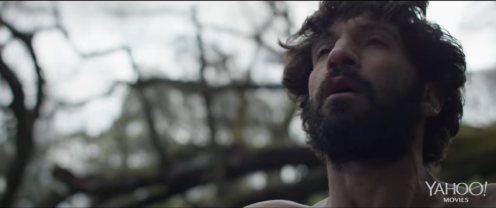
The Mute (Jon Bernthal) at his morning prayers, in Pilgrimage. Screencap.
They continue their journey; Geraldus complains about the weather in French and Ciaran answers him in French. Geraldus asks if he’s seen Rome and he affirms, and then Jerusalem? Ciaran says nothing. He pauses the procession alongside a stream to fill up with water, but the two chieftains object: the stream runs through a fairy fort and is enchanted; he shouldn’t drink it. Rua has to translate it and calls it “the place of the Sidhe. They say the Tuatha De Dannan come out at night and play among those rocks. They cast spells upon the water. Bewitch travelers.”
Geraldus scoffs, resisting the suggestion to move on. “You are soldiers of Christ, you would run from a mere skirmish?” He demonstratively fills his water container, then casts out any demons in the name of St. Matthias and the triune God, and drinks. He wants Diarmuid to do so as well, but Diarmuid won’t; the Mute interposes himself between Geraldus and Diarmuid and swallows huge draughts of water. As the group leaves the area, we see the body of a decomposing sheep in the stream. A little further on, the Mute looks feverish — Ciaran gives him some leaves to give to those who drank from the water. Geraldus asks what it is and while Diarmuid is silent after saying it’s “water mint,” Ciaran answers that they are good for stomachache. Geraldus says he isn’t experiencing any stomachache.
Meanwhile, the chieftains see something in the mountains and decide to abandon the party. Geraldus objects that they were supposed to take them all the way to the Mervilles’ border, but the men insist that war is coming. (This conversation is somewhat inexplicably in English.) The monks are now alone, briefly; they enter a forest (and now, I believe, we’re in Wallonia — the forest scenes were shot in Belgium).

Our first glimpse of Raymond de Merville (Richard Armitage) at right, with his men, when they encounter the monks, in Pilgrimage. Screencap.
They see the Mervilles coming and they are concerned; the stocks they are carrying are weighed and prepared to be used as weapons. Here, as throughout the film, Raymond de Merville announces himself with a horn blast. Geraldus asks the brothers to “have a little faith.”
Geraldus and Sir Raymond speak French with each other. Raymond says he’s surprised to see Geraldus, and when Geraldus says they were supposed to meet up, Raymond notes that not everyone returns from Gaelic territory. He makes a disparaging comment (“You found a souvenir?”) as he looks toward the relic and sees the Mute. After a moment, Geraldus says he’ll discuss it with Raymond’s father; Raymond agrees in a vaguely menacing tone to take him to his father. The Normans (Raymond and another on a horse, and several men on foot) close ranks around the monks and they turn around, proceeding in the direction they came.
They proceed in a rank through the forest on a path, but as they emerge from it toward a stream, they see the carcasses of a little fox nailed to a tree, and under the fox, incised into the bark, a spiral triskelion. Diarmuid asks one of his brothers to explain, and the brother says that it is the symbol of a group (iirc, the Ua Mordha) that had been fighting the Normans. Ominously, he says that the group had been praying to God for help, but God did not listen, so they started to believe in other things. A little further away, they can see two men spearfishing on the other side of the water: poachers, as Raymond notes. He then orders his soldiers (Dugald — Tristan McConnell, and a man with a really impressive face, who’s not yet credit on imdb) to pursue them, and one of them shoots an arrow that hits one of the poachers.
While they are awaiting the results of this pursuit, the monks pause and the Mute kneels on the path and secures his baskets (on the yoke) more closely. Raymond approaches the monks, looks more closely at the Mute, and says to him (in English) that he probably didn’t expect to be a pack-mule upon joining the monastery. Cathal tells Raymond that he’s not a monk, but “a converso. A lay brother.” Raymond says that his men recognize the Mute, but don’t know from where, and asks him to settle their wager on it, naming cities crusaders would visit. There is a veneer of charm and casualness here but anger is seething beneath the surface. Diarmuid senses both Raymond’s menace and the Mute’s discomfort and interjects that the man can’t speak. Raymond asks if he’s also deaf. Rua says that the Mute can hear. Raymond muses that he chooses not to. He then changes into French and asks how someone who can’t speak confesses his sins. Ciaran replies in French that they pray for him. Raymond remarks how good it must be to have friends who do this for him “solely on faith.”
Meanwhile the soldiers have returned and inform Raymond that the poachers are finished poaching — he has two severed hands in his possession and drops them on the ground where the beagles fall all over them.
The march continues, with the sort of long tone of a hurdy gurdy resonating in the background. Eventually the party enters a camp of the Mervilles, filled with fires and white tents and all the iconography of a medieval encampment, where Raymond is met by a hostler who takes his horse and Fournier (Gaëtan Wenders), his father’s aide de camp. Raymond asks after his father and says he’s brought guests along. The energy between the two men is not positive. Diarmuid watches the camp with interest.
In the camp, Geraldus is brought to Raymond’s father, the Baron de Merville (Eric Godon). They embrace. The men speak French with each other. Geraldus tells the Baron he thought he’d be in the south, and the Baron tells him he has to keep his eyes on his border — resistance shoots out of the ground and has to be cut back. He asks Geraldus if he “found what he was looking for.” Geraldus responds in the affirmative. The Baron tells him he’d really have liked to have gone on the Jerusalem pilgrimage at Geraldus’ side, and seen Rome, and met the Holy Father, but now he will probably die and be buried in Ireland. So he asks if he can get a look at the relic to help him in his prayer, to inspire his knights and to support him in completing their holy task (presumably, the continued colonization of Ireland). Geraldus looks slightly hesitant but agrees that he cannot refuse the request of such a devoted servant of the Church.
The next morning — Diarmuid is walking slightly outside the camp in the scrub, and sees the Mute kneeling with his arms extended, facing the sun as if meditating. He has a huge cross tattoo on his back. Diarmuid turns away before the Mute can see him.
Next, we see the Baron, Geraldus, and Ciaran standing in front of the back of the cart with the reliquary, with Raymond directly behind him in a row of knights, and the knights flanked by the brothers. “A pretty box,” Raymond says. Geraldus responds that it is a shell, and directs Ciaran to open the reliquary. Ciaran says, “This is unwise,” but pulls the key to the reliquary out of his cassock as Geraldus tells the official story of the relic: Matthias’ (Judas’ replacement among the apostles) was martyred while spreading the Gospel to the barbarians of Cappadocia. We see a flashback to the rock, dripping with blood. Matthias gave thanks while he was being stoned, so the rock caught fire and burned his torturers and when they cried out for mercy, the ground swallowed them whole (this is why we don’t see any corpses in the flashback, presumably) and Matthias’ body was taken to heaven.
The Baron looks visibly moved, but Raymond is not having it (the expression on his face is incredibly interesting — a combination of disbelief, pain, sarcasm). He says, “and this is that rock? Most impressive!” The Baron apologizes for his son, whom he feels has been living out on the borders too long among the heathens. Even so, the knights all kneel simultaneously and Raymond with them.
Cut to an evening scene, with the Normans and the brothers at a long table under a tent, the remains of a meal in front of them. They are drinking wine. The Baron and his men are complaining in French about how hard it is to get rid of the Irish no matter what they do; they disappear into the bogs. The Baron asks Geraldus what he would do, and Geraldus says he would drain the bogs; the Baron laughs. The Normans are hugely amused. The Baron asks Raymond for more to drink as he needs to drain a bog. More laughter. Shouts of “à boire!” There’s an atmosphere of unease although Ciaran is the only other monk who understands what’s being said.
Geraldus excuses himself. He and Ciaran walk a little way away from the table, speaking English (again, it’s not clear why) and Ciaran asks for details of the agreement Geraldus has made with the Normans. Geraldus refuses until Ciaran points out that the sanctity of the relic and his brothers’ lives are involved, and hints that the Normans are dangerous and can’t really be trusted. Geraldus reminds Ciaran that he knows what the customary recompense is for engaging in crusade: he has offered the Normans absolution. From what Geraldus says, it’s clear that he sees the relationship between the Church and the crusaders as a quid pro quo to get things done and obligate the Normans to them — “the blackest of their deeds bind them to us.” Ciaran disagrees.
Later, Ciaran and Diarmuid (inexplicably speaking English to each other) are seated by a campfire, talking. Diarmuid has talked to Rua, who has that the foreigners know nothing but war and will conquer this land — but he wants to know if there was peace before? Ciaran replies that it was a long time ago, and he was a boy (presumably he’s referring to the years before the Norman invasion of 1170), but that even then there was no peace. When Diarmuid asks why, Ciaran gives a very undoctrinal answer: that peace needs to be grown and “that is beyond the reach of most men.” It’s not entirely clear what Diarmuid makes of this insight.
The next morning, Diarmuid is relieving himself, and when he’s finished, he sees Raymond releasing a pigeon. In English, Raymond accuses Diarmuid of being a spy for his kinsmen. (Interesting insofar as we have no idea about Diarmuid’s backstory.) Diarmuid points out that the monks rise early every day and tries to walk past Raymond. He says that the monks serve God. Raymond is skeptical, pointing out that unlike his father, he is not impressed by pious men: “Anyone can wear the robes of a monk.” The Mute appears, however, and interposes himself between Raymond and Diarmuid. Again, Raymond seems almost to recognize him. Someone calls to Raymond to tell him to assemble his men as they want to celebrate mass before leaving. “Une autre fois, alors,” he says to the Mute (another time, then).
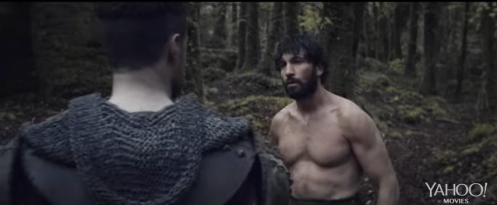
Raymond de Merville (Richard Armitage) and the Mute (Jon Bernthal) encounter each other outside the Norman encampment, in Pilgrimage. Screencap.
Next, we see the camp at mass. There’s plainsong in the background that I didn’t recognize, but it doesn’t sound like part of the Eucharistic prayer. One of the monks is distributing the bread; we see someone (Raymond’s father?) receiving the Eucharist reverently, but Raymond takes a piece and does not look happy. Then Diarmuid passes with the cup and offers it to Raymond, and the look on his face is truly awful.
Cut to the same party as before (monks and Raymond’s men) plus Fournier, passing through the forest. Raymond’s telling (in French) the punch line of a joke that may be about anal sex and infidelity. His men laugh. Ciaran looks unhappy; Geraldus asks him (in English) if he is troubled and Ciaran denies it. They move out of the edge of the forest and as they do, they see heads of Normans on poles. A bridge has been burned out, and again we see the fox carcass and the spiral triskelion.
Raymond sees what has happened, and picks up a shield from his opponents — it also has the spiral triskelion on it. “Ua Mordha,” he screams (the name of an Irish clan), and spits at it before tossing it on the ground. This entire scene is in French. He orders one of his soldiers to return to his father and inform him, then come back. He tells another contingent of men to come with him to pursue the people who burnt out the bridge, because they should be able to catch them. Fournier objects that he’s taking the men away, and Raymond says, “my men.” With a great deal of sarcasm he promises Fournier that they will return in time to protect them.
After they leave, Geraldus asks Fournier if there’s no other way. Apparently several bridges have been washed out, but they will go via “the Hollows.” Geraldus asks what these are, and Fournier says that they are a not-much-traveled part of the woods with a poor reputation that they will change. The much reduced party proceeds through the woods.
They pause at some point — the sounds are ominous, and Fournier calls a halt. As he’s saying “qu’est-ce qu’il se passe?” (I think) a soldier sees the spiral triskelion again, and as he looks more closely, the Ua Mordha (members of an Irish clan) emerge from the woods and attack the party.
A battle ensues. I can’t remember all the unique events of the battle in order, but a few important ones as best I can remember — as it begins, the Mute jumps on Diarmuid and pushes him to the ground as he watches what happens. Someone hits Rua in the head with a hammer and blood spurts out and he dies. Fournier and all of the soldiers are killed. The Mute is knocked out and partially unconscious.
Ciaran, who has been driving the cart, is also knocked out, in the cart. A clansman runs up to the back of the cart and tries to open the box and starts prying the jewels off of it; Diarmuid sees this and tries to interfere; he’s about to get killed when the Mute wakes up, picks up a sword, and saves him. As this particular marauder is killed we hear a clanging sound.
However, this occurrence allows an Irish man to grab the reigns of the cart and take off with the cart — Diarmuid starts running in pursuit. The Irish folk keep pouring out of the woods, including a man with a mask over his head made out of a wolf’s head, and the Mute keeps fighting them. He is very clearly an extremely skilled and vicious warrior. He picks up a sword from one of the dead Normans and kills a few more. At the end, he has really lost control and he bashes the wolf man’s head over and over again with his shield.
Diarmuid is chasing the cart and falls down. The Mute is chasing an Irish man and stumbles over Diarmuid and almost beats him to death before Diarmuid is able to make the Mute aware that it’s him.
At the end of the battle, the cart with the relic / reliquary is gone, in the hands of the Irish, along with Ciaran. All of the Norman soldiers are dead, particularly Fournier, as is Rua. Geraldus, Diarmuid, Cathal and the Mute are left in the place where the battle took place and they debate what to do. Cathal picks up the pearls and jewels that the Irish man had tried to pry off the reliquary. Geraldus wants to pursue the relic. He tells the others than the destruction of all of the people around them is a sign of the miracle; when the Irish man tried to touch the reliquary, the relic caused the destruction of their attackers. He also insists to the Mute that he’s in the service of the church and that his work is not yet done. God rejoices at the destruction of savages. Geraldus presses a sword into the Mute’s hands to urge him onward. Geraldus wants to track the rock — he intimates that the Mute can do this — while Cathal believes they should wait until Sir Raymond catches up with them. Diarmuid worries that the Irish might return first, and tells the group it is their duty to try, so they decide to track the reliquary.
The Mute grabs a number of torches from the carts and hands them to the monks. Then they start tracking. Eventually they head into the forest and the Mute sneaks up on a sentry and breaks his neck while the monks — and we — watch. Then the monks sneak up on the Irish encampment. They can see the reliquary. Brother Ciaran is tied to a tree and his face is covered with snot. As night falls, they debate what to do. Diarmuid points out that they don’t need to carry the reliquary, they just need the relic. He says he will take it and carry it, but he wants someone else to free Ciaran while he’s doing it. Geraldus tells Diarmuid that they can’t do both, that their bodies are God’s tools to do his will, and that Ciaran would tell him the same thing. Geraldus says they will pray for Ciaran’s soul.
Diarmuid creeps into the encampment and begins to free Ciaran (Geraldus is incensed). For some reason Ciaran and Diarmuid speak English with each other. Diarmuid tells Ciaran to save his strength. While Diarmuid is sawing away with a dull knife at Ciaran’s bonds, our attention turns elsewhere as we see Raymond enter the Irish encampment with some of his soldiers. (At least one time I saw it there were gasps of surprise. One of them was mine. I figured he had abandoned the party because he wasn’t into escorting the relic, not because he was actively trying to undermine the relic mission.) Geraldus is outraged.
The leader of the group tells Raymond and his companions in Irish that they want a new deal — that they were prepared to steal the stuff but that they were attacked by a monk. Raymond doesn’t understand any of this and turns to his aid, who explains what happened. Raymond asks where M****** (very complex Irish name) is; I assume this is the murdered “wolf man.” The aid says that he’s dead and a monk killed him.
The camera turns back to Ciaran and Diarmuid. Ciaran tells Diarmuid he has to go now. When Diarmuid refuses, Ciaran tells him that he threw the rock from the cart at the last point where he saw them following it. Diarmuid should find it, and go East, protecting himself and the relic. Diarmuid runs back to the other monks.
Back at the center of camp, the aid tells Raymond that the Irish want the reliquary. Raymond is fine with that, stating that he only needs its contents. But he discovers that the reliquary is empty, and comes over to Ciaran to ask where the rock is. (This conversation is in English.) Ciaran accuses Raymond of breaking his vow to protect them, and Raymond cites his vow to his king. King and pope are quarreling and the relic would be a good piece of leverage in the argument. Ciaran says he would be rewarded for bringing it to the pope; Raymond says he should prove his loyalty to the king, who is worried that the Normans in Ireland are too loyal to their cousins in Normandy. Ciaran states that Raymond would betray his own father’s chance at salvation. Raymond tells Ciaran that his father is too afraid of what will happen after death to safeguard the future of his family.
Raymond asks again where the relic is, pointing out it will be returned eventually. Ciaran says he doesn’t know where it is. Raymond pulls out a nasty tool and says he got it from a priest in Constantinople who used it during the Crusades to get the Greeks to tell them where gold was. Raymond sticks it in and twists it. He offers to kill Ciaran quickly if he’ll tell him where the rock is. Ciaran begins the steps of an exemplary martyrdom — he calls out the name of Jesus in Irish. Raymond calls out to his soldiers to start tracking the monks. He tells Ciaran it doesn’t matter if he won’t tell him — another stone will do just as well. Ciaran tells Raymond that God loves him and that he and God will forgive him. Raymond pulls out his entrails. This is nasty to watch and frustrating in that if you don’t catch what Raymond is saying here, his motives remain completely obscure because he never states them at any other time.
Next, we see the remaining monks (Geraldus, Diarmuid, Cathal) and the Mute looking through a clearing with the aid of torches. They find the rock or what they believe to be the rock. Geraldus leads them in saying four verses from Psalm 94 (Vulgate: Psalm 93), while they look at each other. Diarmuid puts the rock in his medieval messenger bag. Then Geraldus starts to lecture him about his disobedience over Ciaran; Diarmuid’s duty is to obey. They are in an eternal war with the Devil and “in this war, he waits a lifetime, an eternity, for a single moment of witness such as yours. Do not give it to him again.” The next morning they are using the last of their water, getting ready to go. Cathal is convinced that they will be killed. “We are not alone,” Diarmuid says. “We are never alone. Have faith.”
Next we hear Raymond’s horn and a clanging sound at the same time — just as the monks emerge into a vista where they can see the river and thus the way to Waterford. “Praise be,” Geraldus says, “God has heard us.” They rush to the river’s edge, pursued by Raymond, and get in the water in hopes of confusing the trackers. They take cover, crouching in a clearing. Raymond and his men are near, but there is a tremendous amount of fog and he can’t see them.
Raymond is clearly frustrated and begins to taunt them (in English): do they think they can walk on water? He offers to let them live if they give him the rock. “It shouldn’t be a difficult decision,” he says, “pas pour un soldat,” switching into French and apparently referring to the Mute. He says that the Mute has changed his appearance, implying that he knows him (but we never find out in detail how); a man can change his appearance and the way he speaks but not who he is. The camera flashes back and forth between Raymond and the frightened monks. Raymond begins slashing through the brush, telling the monks to keep the rock; he will get a different one, but they should kill Geraldus. At this, Geraldus says something, and the monks shush him. Geraldus tells him he is endangering his salvation, and Raymond says that if he waits long enough, there will be another crusade and another chance for absolution; it is the way of the world.
Raymond then switches back into English and asks whether Geraldus has told the monks how he got this very important responsibility? He then says Geraldus’ entire name — which I didn’t understand fully but which ended in d’Albi — so he was from a noble family in Albi (France), a major center of Catharism (the film doesn’t tell you this). Raymond says that when Geraldus discovered that his father was supporting heretics, he had him tortured and then burnt at the stake. Their lands went to the Church, thus securing Geraldus’ future. Geraldus says something and one of Raymond’s soldiers shoots an arrow at him, narrowly missing.
The monks get up and flee, eventually emerging through the water into a clearer area, where they hear a clanging sound. It’s a ship’s bell. At this point, the film’s score switches into anachronistic polyphony, which for some reason really bothered me, although it won’t bother most viewers. They find a rather violent and greedy boatman and his mate, who speaks to them in Irish, threatens them with a hammer and doesn’t agree to take them (despite assurances of payment upon arrival). Geraldus loses his composure: “We are men of the cloth; doesn’t that mean anything in this accursed country?” and Diarmuid cautions him to calm down. Geraldus wants to sic the Mute on the boatman, but Diarmuid rejects this possibility and Geraldus starts to say that Diarmuid is evil and not worthy to carry the relic, when Cathal comes up with the jewels from the reliquary and they receive transport.
They all get into the boat. Geraldus starts reciting the Lord’s Prayer in Latin. Diarmuid asks Geraldus if what Raymond said about him is true. Geraldus says he serves the Church and his conscience is clear, silencing any questions Diarmuid might want to ask. Geraldus continues with the information that his father never repented and never thought he had done anything wrong. But Geraldus learned that day “it was not his faith in the Church that he lost, it was his fear of it.” All seems well, though, until they wash up on a sandbar — the tide is going out. Just as they notice this, they hear Raymond’s horn again. We see Raymond and a few of his men riding across the sands toward the boat.
The boatman gives the jewels back and tells them to get out of the boat; Diarmuid points out that they are not going to leave any witnesses. They toss out all the goods in the boat. Geraldus takes this chance to urge the Mute to turn around and confront Raymond and his men — saying he has not yet done enough to be saved, and offering him absolution in exchange for the defense, at the end appealing, “save us.” Interestingly, Geraldus addresses the Mute with the informal “you” (tu). As he speaks French, the other monks don’t really understand what is being said although they ask. The Mute turns toward the soldiers and the boatmen and the monks start pushing the boat through the sand toward the river, as arrows from Raymond’s archer get closer and closer to them.
Eventually, the monks get the boat going on open water, but as they get underway, an arrow hits the boatman’s mate and he falls in the water. This is interspersed with cuts of the Mute preparing to fight (he takes off his shirt) and then fighting with Raymond’s men. Raymond orders his men to concentrate on the rock, not on the Mute. The monks are rowing like crazy. Raymond orders his men to try to catch the boat at Waterford. On the boat, Cathal turns toward Diarmuid but he has an arrow in his chest. Back on the beach, the Mute has fought his way through most of Raymond’s men (he bites one on the ear) and fights with Raymond. Raymond inserts the disemboweling tool into the Mute’s stomach, taunting him that he will suffer while the monks watch, but the Mute is not easily deterred. He continues fighting and when he gets close to Raymond, Raymond says, in French, who are you? where are you from? and the Mute pauses for a second, whispers “Hell!” and then bites through Raymond’s jugular vein.
Back on the boat, Geraldus tries to convince Diarmuid that a miracle is occurring and that the sound of the swords from the fight on the beach is the sound of the angel striking the relic. “The bell will inspire an army of men like him. Men who will retake Jerusalem. Men who will retake the world. … All doubt will be swept away. Stand with the Church and live, or stand against it and be crushed.” Diarmuid pulls out the relic, and it looks like he’s going to throw it overboard — he wants to give it back to God. Geraldus tries to take the relic away from Diarmuid, and the boatman warns them to be still or risk capsizing. Geraldus falls into the water with the messenger bag with the rock and seemed to have drowned.
We see Raymond’s dead body on the beach, and the Mute breathing his last breaths. Diarmuid is standing in the boat. He looks out at the landscape, which we see with him. The boatman says, “where to now?” Diarmuid look at the boatman, helplessly.
Film ends.


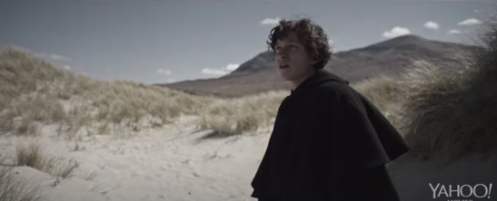
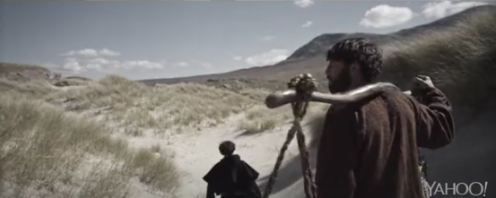




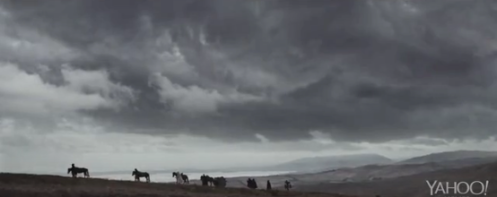
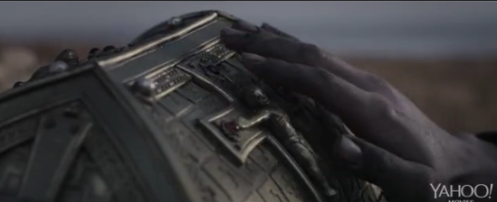

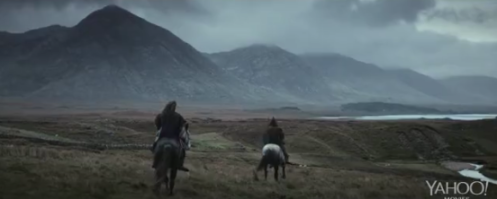
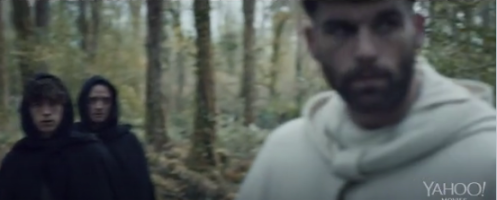
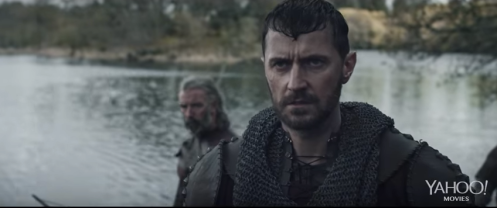
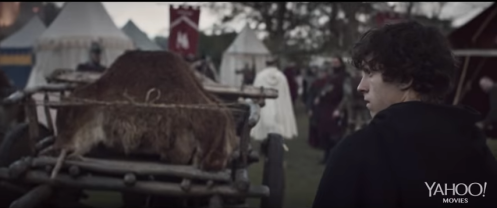


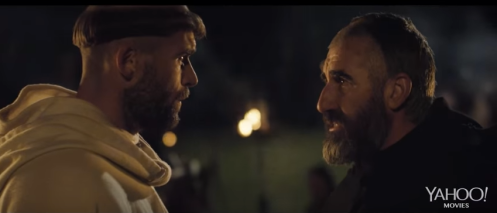


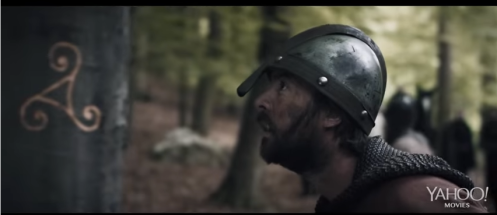





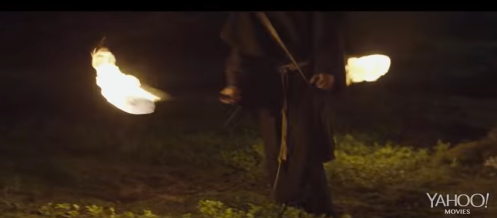
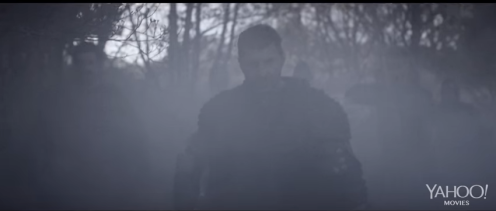


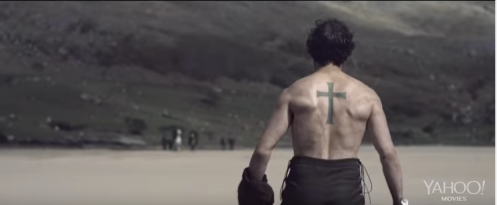




Not yet, thank you for the warning: spoilers! I should wait until it will come by us in Europe!
LikeLike
Yup, in principle I want people to wait. I wrote this so I had a coherent memory of the film to work off of for my final review.
LikeLiked by 1 person
I could not resist. I skipped down to the last paragraph. That told me enough. I will still be surprised by everything else in the film. Although I did not read it, thanks for the comprehensive summary. I will use it often to refresh my crappy memory once I have seen the film. You are amazing. I don’t know how you can remember such detail. Even after multiple viewings, I could not recall what was on the screen that well. I am judging the detail by the length if the post, not the content.
LikeLiked by 1 person
LOL.
I have a good memory, but I also saw this three times and had a notebook in front of me — this theatre had movable trays attached to its reclining seats, actually for drinks and popcorn but I used it to write with, so I just jotted down a note or dialog when they seemed important to me.
LikeLiked by 1 person
I wanted to wait but I couldn’t bear it. I felt like the little kid who couldn’t resist taking a peek at their Christmas presents when no one was looking. Thank you for writing this summary. It explains many things going on in the film, some of which I might miss when watching for the first time. I don’t feel that reading this spoiled the film for me. In fact I’m looking forward to seeing it even more.
LikeLike
I’m glad you’re not annoyed that you read it. i think it is worth seeing more than once, so …
LikeLiked by 1 person
I only look at the pictures and try to answer the question: who’s the actor ? Elya Baskin for the Abbot ?
LikeLike
I see the resemblance, but I don’t think that’s him.
LikeLike
Und die Moral von der Geschicht’?
Vor der Reliquie Angesicht
ein jeder ist ein Bösewicht,
nur der junge Diarmuid nicht.
Danke für die Inhaltsangabe. Ich hab kein Problem mit Spoilern, im Gegenteil.
Außerdem war zumindest eine Sache längst klar: Raymond überlebt nicht. Wäre es zur Abwechslung mal so, dass Richards Charakter nicht stirbt, wäre die Sensation auf Twitter gelandet, noch während der Abspann der ersten Vorführung lief. 😀
Hm, kann es sein, dass the Mute das brennende Schaffell von der Kiste reißt oder die Kiste berührt? Oder welchen Grund gibt es, dass Geraldus feststellt, dass the Mute die Reliquie nicht fürchtet?
seufz
(quengel) Will auch sehen!
😉
LikeLike
yeah, that could be. I honestly don’t remember, insofar as at the time it didn’t appear to be to be crucial thing about the scene to me.
LikeLike
This is fabulous! Just a quick correction–the morning scene where Diarmuid sees the Mute at his morning prayer happened before the monks met up with Sir Raymond–it happened after the first evening where Geraldus asks about the Mute and how he came to be at the monastery.
LikeLike
Thanks — for some reason I remember the scene but never had occasion to put it in my notes and couldn’t remember where it was! (I knew it had to be before they left the camp)
LikeLike
Thanks a lot for posting it. I’ve read it carefully.
Since there is still no release date for my country and I don’t know when I will be able to watch it, I read all materials about the movie appeared after Tribeca screening.
Looking forward to your review with spoilers.
LikeLike
Someone will definitely pirate this as soon as it becomes VOD capable. (Of course, I thought someone in Asia would pirate BOF and that prediction has turned out to be wrong, too.)
LikeLike
[…] from Servetus, here ( caution – major spoilers in the linked […]
LikeLiked by 1 person
[…] Post assumes you have seen the film or are aware of the detailed summary, as well as the list of errors in the portrayal of religious history in the film. And I assume you […]
LikeLike
Brendan Muldowney’s Pilgrimage as a comment on religion, medieval or modern | Me + Richard Armitage said this on July 4, 2017 at 7:39 am |
It’s a very good and detailed summary, useful also for those who’s already watched the film. Please, may I translate it into Russian and share with Russian fans? Of course, all rights will be reserved.
LikeLike
Wow. Yeah, sure, of course.
LikeLike
[…] “Detailed summary of the plot of Pilgrimage [HUGE SPOILERS],” May 6, 2017. Summary of film after seeing it in Tribeca at the end of April. Kind of cool: someone wanted to translate it into Russian. […]
LikeLike
2017 at “me + richard armitage” in review | Me + Richard Armitage said this on December 28, 2017 at 10:44 pm |
I felt like the light rays breaking through the clouds at the end were significant, didn’t you? As if to say, “Neither religious fanaticism nor brutal power, both of which are, after all, quite earthly, give us direction but there is perhaps nevertheless a more sublime light that really shines the way for those willing look high enough.
LikeLike
Thanks for the comment and welcome. I thought they were significant, though I’m not sure what they mean. (I also know that they filmed these shots on a limited budget on a very limited number of days, so I don’t know how well they could either plan something like that, wait for it, or edit it out of their shots). As the filmmaker is explicitly anti-religious, though, I tend to doubt it was a spiritual message.
LikeLike